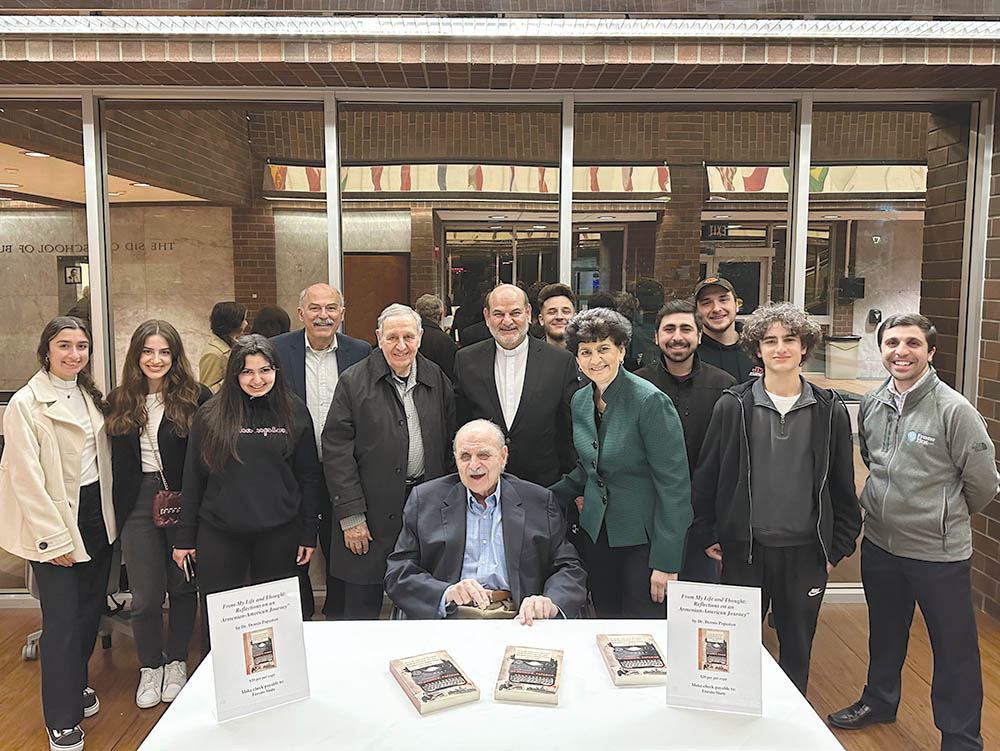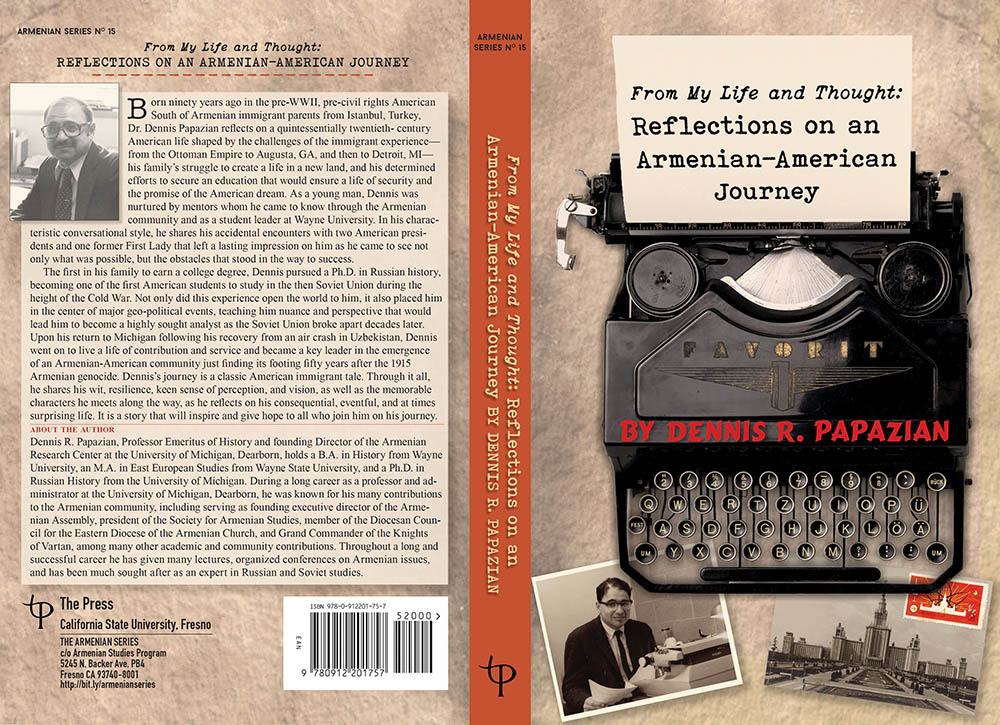
Photo: ASP Archive
Hannah Paloutzian
Staff Writer
“I am convinced that there is much more which unites Armenians today than that which separates us,” stated Dr. Dennis Papazian, in a speech given at the 70th Anniversary celebration of Armenian Independence, June 4, 1988, in New York City.
On Thursday, February 23, 2023, Dr. Papazian and his wife, Dr. Mary Papazian, discussed his very interesting life, as documented in his book, From My Life and Thought: Reflections on Armenian-American Journey, published by the Armenian Series of The Press at California State University, Fresno.
The stories and anecdotes related during the presentation, part of the Armenian Studies Program Spring 2023 Lecture Series, were based on Dr. Papazian’s memoir.
Dr. Dennis Papazian is Professor Emeritus of History and founding Director of the Armenian Research Center at the University of Michigan, Dearborn, where he is known for his many contributions to the Armenian community.
Dr. Papazian’s presentation began with a story of his father’s journey to the United States at the beginning of the Armenian Genocide. His father was born Nahabed Zeronyan and he and his two brothers left Istanbul for the United States, acquiring a Greek passport using the name Charlie Pappas. After he entered the United States, Nahabed changed his last name to Papazian and the family settled in Augusta, Georgia, where he sold fruits door-to-door, until he saved up enough money to open a restaurant called “The Busy Bee.”
Dr. Papazian was born on December 15, 1931, in Augusta. His family later decided to move to Michigan, where they could be closer to relatives. One of Dr. Papazian’s earliest jobs was as a mail clerk for the Mutual Benefit Life Insurance Company. He later attended college at Wayne University (later Wayne State University), where he was one of a small group of students to meet President Eisenhower at the White House.
Dr. Papazian later had the opportunity to meet and speak with Mrs. Eleanor Roosevelt as a result of his participation in the Collegiate Council for the United Nations. His meeting with Mrs. Roosevelt took an unexpected turn when she asked him if he came from a wealthy family. When Dr. Papazian replied “No” and asked why, Mrs. Roosevelt told him, “You could have had a brilliant career in politics.” Dr. Papazian felt a bit offended by her comment, as he felt it was contrary to what the United States stood for. That conversation with Mrs. Roosevelt had such an impact on Dr. Papazian that later in life he chose not to run for Congress despite invitations to do so.
 Another story told by Dr. Papazian was from his time studying for his doctorate at the University of Michigan, Ann Arbor. Dr. Papazian had written a paper on Armenian history and was told by his professor that, “Little people cannot write their own histories because they won’t be honest and accurate.” Dr. Papazian was stunned by this comment but was not deterred from continuing to study Armenian history.
Another story told by Dr. Papazian was from his time studying for his doctorate at the University of Michigan, Ann Arbor. Dr. Papazian had written a paper on Armenian history and was told by his professor that, “Little people cannot write their own histories because they won’t be honest and accurate.” Dr. Papazian was stunned by this comment but was not deterred from continuing to study Armenian history.
Dr. Papazian and Dr. Mary Papazian discussed various experiences in Dennis Papazian’s life such as the time he survived an airplane crash, his return to the United States from the Soviet Union to become a history professor, and how he eventually took a four-year leave from the university to help found the Armenian Assembly of America and to later become its Executive Director. As Dr. Papazian mentioned, this was very important considering that there were few Armenian institutions and Armenian Studies Programs when he was growing up.
Dr. Papazian was also heavily involved with the “Aid to Lebanon” program, which helped Armenians under threat during the Lebanese Civil War. The “Aid to Lebanon” program assisted orphans and widows, funded schools, and awarded microloans to Armenians in order to restart their small businesses that had been damaged during the Civil War.
At the end of this presentation, Dr. Mary Papazian read the speech that Dr. Dennis Papazian gave at the 70th Anniversary celebration of Armenian Independence, on June 4, 1988. The speech was a call for the Armenian people to come together and recognize the strength Armenians have when working together. Dr. Papazian discussed the history of the Armenian people and their perseverance through adversity, and the appreciation Armenians must demonstrate for the generation that survived the Genocide. He stated that Armenians must thrive on love, not hate, and that had there been no Armenian Republic of 1918, there would be no Armenia as we know it today.
Dr. Papazian’s presentation was inspiring and many audience members continued the conversation with him after the lecture to learn more about his fascinating life.
Dr. Papazian’s memoir is available through Abril Bookstore: http://www.abrilbooks.com/from-my-life-and-thought.html or the NAASR bookstore: https://naasr.org/products/from-my-life-and-thought-reflections-on-an-armenian-american-journey?_pos=1&_sid=23ffde0db&_ss=r.
 Hye Sharzhoom Armenian Action
Hye Sharzhoom Armenian Action